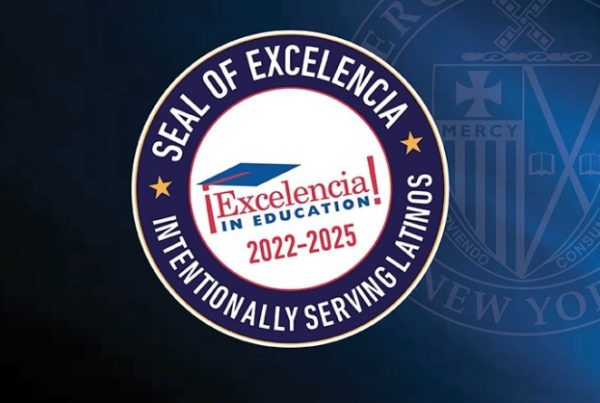By Advancing Hispanic Students Lives, Mercy Earns Seal of Excelencia

Mercy College on Sept. 30 became the first private Hispanic-Serving Institution to earn the prestigious “Seal of Excelencia” from the Excelencia in Education. This certification is given to institutions that demonstrate the capability to advance Hispanic students’ success not only in their education but their lives beyond college.
The certification was presented by Allan Golston, president of the Bill & Melinda Gates Foundation via national broadcast from the Mayflower Hotel in Washington D.C. Only thirty other institutions have been awarded this certification, but it’s clear why that’s the case. Mercy College has adequately displayed the efforts they have made over the last twenty-five years to set students up for success allowing them to thrive.
According to Mercy College President Tim Hall, it’s not only changed the mindsets of those running the college, but their way of doing business by welcoming students of diverse backgrounds with open arms. It’s allowed them to be a leader nationwide and actively make improvements in areas that directly impact the students attending the school.
With that said, they’ve been able to maintain a full-time enrollment rate of at least 25% for Hispanic students, while averaging a whopping 44 percent undergraduate Hispanic population rate, a feat many other schools have failed to achieve. At the same time, Mercy College is honored to be named the largest New York Hispanic Serving Institution issuing 557 bachelor’s degrees to Hispanic students in 2019 and 2020.
It doesn’t just stop there though for the list of achievements Mercy has acquired over the last 25 years. In addition to the countless bachelor’s degrees issued, Mercy has been able to increase its Hispanic student graduation rates by 16 points within the last decade. Mercy has done this through the introduction of its PACT Mentor Program. A program designed to provide students the assistance and commitment they need to not only attend their classes but get them to graduation.
The program has offered resources for setting up classes, mental health resources for students who may be struggling, to even just being a helping hand when needed most. Having a program like this in place at Mercy has made the transition into college for many new students seamless, and the same applies to those returning alike. It has done wonders in motivating students to finish out their education and has secured their spot amongst the Mercy College community.
The hope of each student coming to the campus for the first time in attaining a degree, and that is what Mercy College has always put its best foot forward in guaranteeing the receiving of the degree upon graduation. Former graduate of Mercy College, and now a social worker for The Graham School, Lisa Nunez had something to share regarding her experiences in college and how the education she was given had transformed her life for the better.
“As a psychology major, I didn’t know what to expect. Honestly, all I knew was that I wanted to help people and be their support, something I wished I had growing up.”
From the beginning, Nunez wanted to be there for people and had a generous heart to share with the world. It became abundantly clear that her desire to be a shoulder to cry on started at a young age. Nunez revealed that at an early age, she’d have to take care of her three other siblings, while her parents were at work trying their hardest to simply put food on the table.
Having to look out for her other siblings, as if she was their mother took a toll on her and was difficult to overcome, yet with determination, she was able to not only recognize but embrace her one power. That power is one of love.
“Love is what drove me to Mercy, I wanted to give every ounce of love I gave to my family, but this time to the world.”
Nunez’s first day at Mercy felt exactly like her last. On her first day, she’d arrive at school by bus, the only form of transportation she had access to coming from a poor household, struggling to make ends meet. Nunez detailed the feeling of walking into class, and she felt excited, yet anxious to be there because she didn’t know anybody there. She knew it would be a challenge making new friends, considering she was a commuter student, but this didn’t stop her from trying.
Soon after, she’d make the best of friends and balance her new schedule throughout the next four years while working a part-time job at Nathans. She worked tiredly at not only being the best student but worker by applying herself in everything she’d put her mind to.
“I recognized that getting through college wasn’t all about motivation and that it was more so about discipline and a will to persevere.”
At graduation, the same feelings that she felt on her first day came back to Nunez in a sweeping motion. There was one thing that made the onslaught of feeling a bit different though. The difference was where her excitement was directed toward. She no longer was afraid of the future and of the unknown.
“I knew what the future had in store for me. In my eyes, it was a future filled with love and spirit that I’d always dreamed of.”

Joshua Ochoa Diaz is a junior year Journalism major at Mercy College.
He writes a column titled "Cluttered Library of Thoughts", where he likes to talk...







